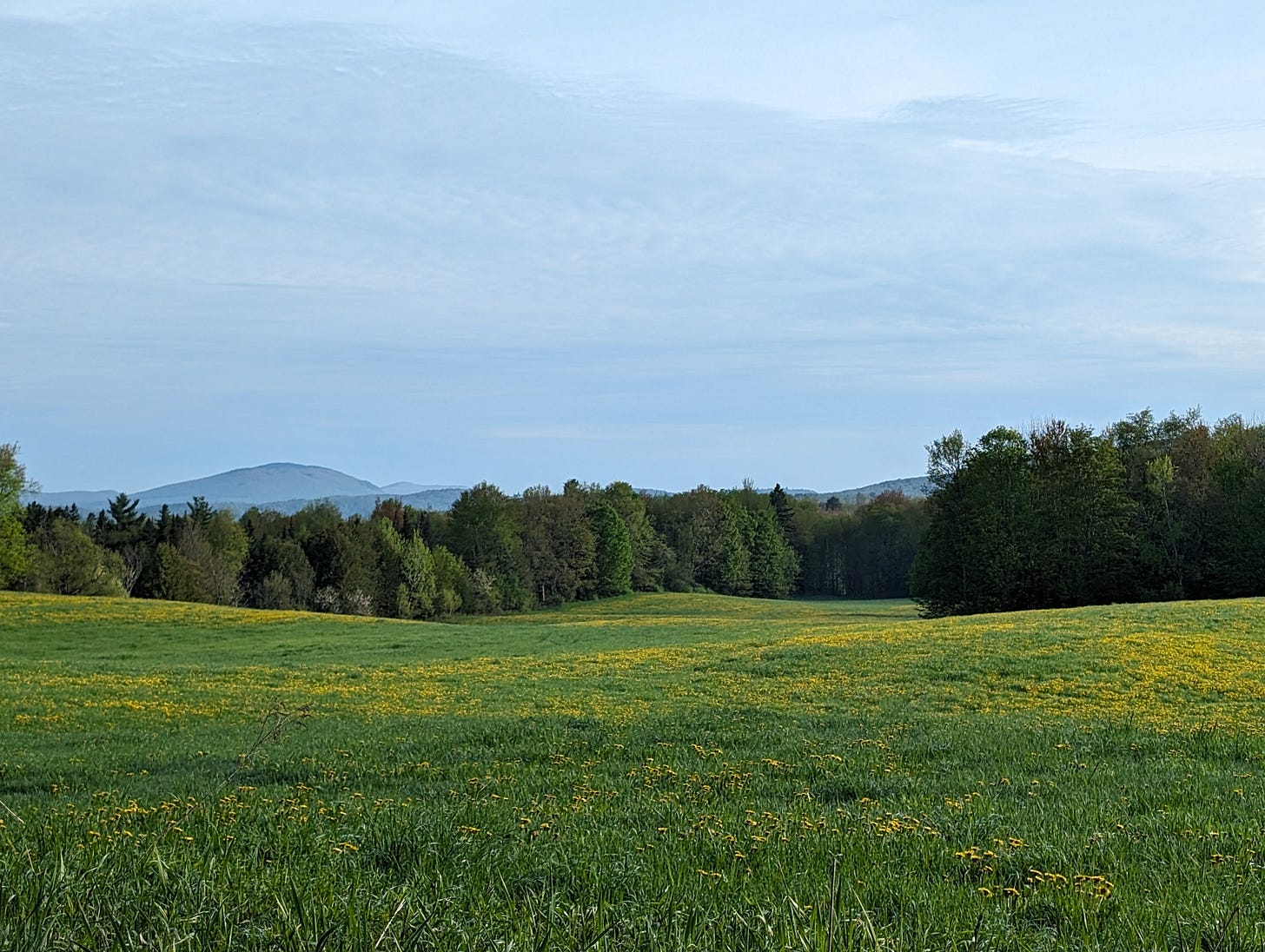These Days of Pentecost
Recovering from Pentecost envy, our story woven into the Holy Spirit's story
When the day of Pentecost had come, they were all together in one place. And suddenly from heaven there came a sound like the rush of a violent wind, and it filled the entire house where they were sitting. Divided tongues, as of fire, appeared among them, and a tongue rested on each of them. All of them were filled with the Holy Spirit and began to speak in other languages, as the Spirit gave them ability.Now there were devout Jews from every people under heaven living in Jerusalem. And at this sound the crowd gathered and was bewildered, because each one heard them speaking in the native language of each. Amazed and astonished, they asked, “Are not all these who are speaking Galileans? And how is it that we hear, each of us, in our own native language?…All were amazed and perplexed, saying to one another, “What does this mean?”
Acts 2:1-8, 12
Like a few other Christian holidays, this Day of Pentecost is a remix and build-upon of a Jewish celebration. Known as the Church’s birthday, it’s a celebration in remembrance of the Holy Spirit descending on the fiftieth (“Pentecost,” as early Greek-speaking Jews would call it) day after Passover. According to Acts, it is on this day that the Holy Spirit poured out on the first followers of Jesus after his ascension, prompting Peter to weave Scriptural prophecy together with personal testimony to give the first mini-sermon in Church history, inspiring thousands of others in Jerusalem to be baptized.
But despite the joy and triumph in this story marked by all the red and gold that liturgical Christians wear, it can be a surprisingly challenging holiday for some.
Some are simply allergic to the word because it makes us think of those other Christians, who seem to really lean into tongue-speaking and revival tents. For some small churches, it might go deeper.
We might have something I’ll call “Pentecost envy.” We might be hearing this story with such vivid imagery that can’t come close to capturing the real scene, sitting in pews emptier than we’d like, and we might be wondering, “Where’s that ol’ mighty wind? Where’s the fire? Why can’t we have some of that Holy Spirit revival?”
Shavuot (and Other Gentile Attempts at Relating)
So to help with our allergies, I’m going to turn to some just-beyond-Wikipedia-level research and lean into the word of what many of Jesus’ followers would have said, the non-Greek speakers: Happy Shavuot.
There is always some tension between how Christians interpret Jewish holidays, either out of gross negligence to their context or violence to the extended autonomy of their tradition. But thinking of Shavuot (pronounced sha-vu-oat) might help us break out of our routine associations of Pentecost as the Holy Spirit’s Epic Arrival, sometimes with the urgency of Pentecostal envy to manufacture its presence, to feel what it might have meant to those who first attended.
The early Church didn’t gather thinking they were inspiring megachurch band after megachurch band, much less receiving the Holy Spirit. They were just gathering for their second of three Jewish pilgrimage festivals instructed by the Torah, the “Feast of Weeks,” or "Festival of Reaping,” or “Day of the First Fruits.” This name comes from the Passover rituals connecting the departure from Egypt with the harvest of barley, followed fifty days later by the harvesting of wheat and God’s giving of the Torah; this festival also marks the day that Moses is said to have gone on Mount Sinai to receive the nature of the sacred relationship between God and God’s people. So symbolically, this represented their journey from “mere” barley out of Egypt into the fullness of being wheat, fulfilled by God’s gift of the Teaching.
In other words, to the earliest Jewish Christians, Pentecost/Shavuot was a celebration and revelation of life through the living God, the revelation and reception of his Word, and God’s work in their lives becoming all the more real.
But the intertextuality doesn’t end there. Pentecost/Shavuot is when King David’s birth was announced, and also the day he died. David was a descendant of Ruth, whose book focuses on harvest and is often read on the holiday. The Jews of the early Church would have also been counting down the days with a daily ritual, called “counting the ‘Omer,” waiting to commemorate the gift of God’s arrival.
So this was a big day full of connections. These early Jewish Christians would have made their pilgrimage back to Jerusalem like everyone else in their religious community. But in early tensions with their community, they were (as Matthew’s gospel especially emphasizes) starting to believe that Jesus Christ, as God and Son-of, was both author and revealer of the Law himself. If the ancient Israelites were freed from Egypt to receive the gift of Torah, then on this Pentecost day, the early Church was becoming free from sin in order to receive the Holy Spirit, freed from the bondage of death in order to receive the New Covenant of the same living Word, the latest expression of the really real God, here and now.
But they still wouldn’t fully get it as it was happening.
The Interweaving
The first Christians (before yet calling themselves Christians) were still getting to know the Holy Spirit. They knew Jesus had resurrected and ascended and said he would send his Helper, but they did not know when. If we have Pentecost envy now, they didn’t even know what they didn’t yet know about the Spirit to be jealous. As I wrote about a couple of weeks ago with some Holy Spirit 101, they would learn that the Holy Spirit is a Person who does what he wants to do. We can’t manufacture the Spirit, we can’t bang on the side of our church like a dead printer, “Come on, descend!” So what can we do?
Well, the reason all the history above about Shavuot is important is because even though we can’t manufacture the Holy Spirit, we can celebrate it, understand it, and look at just how intricately woven the Spirit’s movement is across the story of God and God’s people. We do this so we don’t focus on all the fireworks of Pentecost—wind, flame, sound, language—and be mistaken about what the real God is really about.
And while we have some idea of what that festival meant in retrospect, there are even more linkages to the story of God that culminated on that Pentecost day.
The prophets had alluded to it over and over. God told Ezekiel that he would breathe his Spirit into the “dry bones” of his people until they became a living body. Or take Zephaniah 3:9, “For at that time I will change the speech of the peoples to a pure speech, that all of them may call upon the name of the Lord and serve him with one accord.” Or Jeremiah 32:39, “I will give them one heart and one way, that they may fear me forever, for their own good and the good of their children after them.” Or Malachi 3:1, “Behold, I send my messenger, and he will prepare the way before me. And the Lord whom you seek will suddenly come to his temple; and the messenger of the covenant in whom you delight, behold, he is coming.” This isn’t even counting a story from the Torah, where in Numbers 11, “The Lord came down in the cloud and spoke to him, and took some of the Spirit that was on him and put it on the seventy elders. And as soon as the Spirit rested on them, they prophesied.” There are even more intertextual links that missed the cut here.
Perhaps most profoundly and best understood by Christians, this moment marked the undoing of the Tower of Babel from Genesis 11, where humans had been scattered into confusion with different languages, and were now united across them in the Spirit. Pentecost showed the movement from the mindset of “How can we reach up and become like God?” to “How is God reaching down and drawing closer to us?” And yet, if we suffer from Pentecost envy, we may still suffer the temptation of wanting to make ourselves more like God, trying to make an idol of the Holy Spirit in our emotional-experiential image, forgetting that we are sinners in need of receiving Grace in all its forms, and that it is an expression of our sin that wishes to close our separation from God through flawed means that create even more separation.
The early Church was not trying to be like God. They were not saying to themselves, “How can we generate the Holy Spirit?” They were just being faithful. They were celebrating their religious holiday as a faithful people, celebrating the fruits of the harvest, celebrating the Torah as the gift of life, paying close attention to what God had already told and shown them—not them personally, but deep in their ancestral memory, God weaving this intricate story of their past to point them to the future looping through the present.
And despite all this interweaving, they didn’t fully understand it as it was happening. “What does this mean?” (Acts 2:12)
Holy Spirit in the Rearview
So much of God’s work only makes sense in the rearview mirror. Sometimes the Spirit is moving us to do things that align with our hopes and dreams, sometimes thwarting our goals, sometimes giving us perseverance to push through challenges, and sometimes, the Spirit is telling us to slow down, stop, or even reverse. But we often don’t know which is which until after the Spirit has blown on.
The early Church wasn’t thinking, “Oh, here’s the Tower of Babel being reversed and the New Covenant being fulfilled through Jesus sending his Advocate like he said he would.” Peter began making sense of this in Acts 2, but it still only would have been fully grasped in hindsight. We do not celebrate a day of complete understanding, but a day when it was undeniable that the Spirit was there and telling them that Jesus Christ was really the real deal, and they were really united in his body.
We celebrate the moment the Church-before-the-Church realized what it had to do as a church, unifying just as Jesus prayed for in John 17. As they recalled, Jesus had prayed for an ongoing relationship with them, which the Spirit brought them in his physical absence. He prayed for a unified church that would help other people believe through them, which the future church is still called to do.
And so the Spirit came.
And if you are a Christian, you don’t need to wait for the fireworks of the Holy Spirit’s descent. The Holy Spirit is already indwelling in you.
We can’t make the Holy Spirit enter into someone’s heart or not. Like Peter did in that first sermon and as they would throughout Acts, we can just bear witness to our relationship with God, and by the grace of God, some people might feel something of a relationship with God through us, just as we first felt a relationship with God through someone else.
Like I’ve said with my mom and grandmom, anyone reading who has a relationship with God has a long chain to give thanks to, all through history, all the way back to this group we’re reading about. All those people who believed for the next generation and let us believe through them. Those lucky people on that special Pentecost didn’t come to believe by their own merit either, relying on the Holy Spirit to tell them that Jesus Christ, the risen Lord, meant what he said. And now the ball was in their court.
They were not, and we are not, given the indwelling of this Holy Spirit to hold on just to feel righteous. We people of faith are all called to help people in our communities have some measure of God’s grace, peace, hope, and love through us. Not by our merit, but by how much we allow God to work through us. And maybe there’s no epic wind, maybe there’s no insane language telepathy, maybe there’s no rattling windows, and maybe the fire isn’t above our heads, sure, but that’s because it’s now in our hearts. Like Moses, we’re not getting burned or consumed, but that fire? Oh, it’s still real. We just need to be faithful to that flame.
The antidote to Pentecost envy
What is the opposite of Pentecost envy, then? I would say it’s gratitude, for gratitude is the antidote to so many expressions of our sin. When sin tells us to deform and twist ourselves and try to bend the world for our power to close the gap we feel with God, gratitude is overflowing with the full trust and knowledge that we already have so much more than enough: we already have the Holy Spirit.
What’s our most specific Pentecost gratitude? For Christians, it’s just what the Holy Spirit came to definitively testify: through Jesus Christ, our God is really real, here and now. It wasn’t just that one day of Pentecost. We’re still living in these days.






